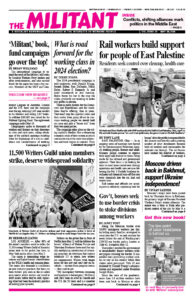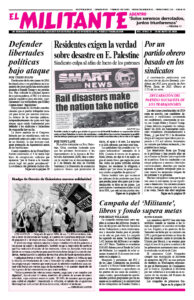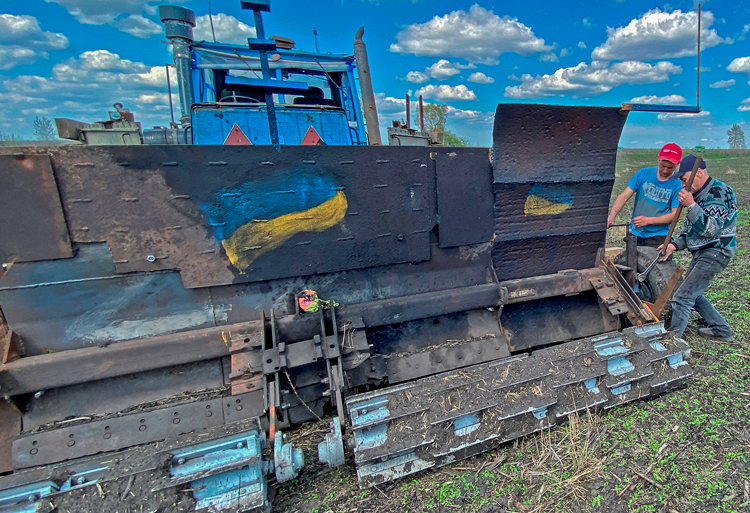Moscow’s troops have been pushed back by Ukrainian forces in Bakhmut, the primary target of Russian President Vladimir Putin’s winter offensive. The retreat was a blow to Putin who predicted control of the city by May 9, a celebration marking the former Soviet Union’s victory in World War II.
The nine-month battle for Bakhmut, the longest of the Ukraine war, is the scene of the bloodiest ground combat in Europe since the second imperialist slaughter, with thousands of Russian soldiers killed and many Ukrainians, including countless civilians. The city has been largely destroyed, with a fraction of its 71,000 inhabitants still there. Yevgeny Prigozhin, whose Wagner forces have borne the brunt of Russia’s casualties in Bakhmut, complained bitterly about Moscow’s military blunders.
Ukrainian troops have seized the ground overlooking the city and reopened the main highway from the west, after being pounded for months.
Moscow has shown no sign of ending its invasion despite growing opposition inside Russia. There are fresh graveyards across the country, some as large as several football fields. More Russian soldiers have been killed in Ukraine than in the 10-year Soviet-Afghan War and the First Chechen War combined.
Many were fathers and their family’s sole breadwinners. The country’s birthrate next year is expected to drop to a level not seen since World War II.
More than 1,000 men in Russia have been convicted of evading mandatory military conscription. And over 1,000 soldiers have had criminal cases opened against them for abandoning their units.
Teachers refuse to follow Putin line
Since September the new school week has started with a class called “conversations about important things.” The Kremlin decides what these “things” are and pushes its propaganda supporting the invasion.
When 10-year-old Varya Sholiker skipped these lessons, authorities visited her home, finding blue and yellow — the colors of the Ukrainian flag — in the apartment. They concluded her mother, Yelena, “does not exercise parental control” and ordered mother and daughter to undergo psychological counseling.
Irina Gen, an English teacher, condemned the invasion in class. After a student recorded her remarks, she received a five-year suspended sentence and a ban from teaching for three years.
Many teachers don’t openly speak out against the war, but avoid talking about it so they don’t have to parrot Putin’s lies about the invasion.
Math teacher Tatyana Chervenko used class time to teach math instead of the Putin-decreed “conversation.” Word got out and she was taken to the police station for interrogation and then fired. The Russian Alliance of Teachers defended Chervenko. Its chairman, Daniil Ken, has been classified by authorities as a “foreign agent.”
After baker Anastasia Chernysheva was ordered to pay a fine of $446 last month for decorating cakes with anti-war slogans, nearly all of the cakes customers have since ordered have been with anti-war decorations.
“Until I get jailed,” 22-year-old Chernysheva told the Moscow Times, “I’m just planning to bake cakes.”
For a second year Ukrainian farmers are planting crops under war conditions. Grain output, which was 60% of the country’s exports before the war, has dropped sharply.
Prime Minister Denys Shmyhal told the press in April that about 30% of Ukrainian territory had been mined by Moscow, part of Putin’s campaign of terror against the Ukrainian people.
Near Kharkiv, one Ukrainian farmer has come up with a novel way to remove mines and unexploded shells from his fields. He outfitted his tractor with panels stripped from destroyed Russian tanks and operates it by remote control. “We started doing this just because the crop-sowing time has come,” Oleksandr Kryvtsov told Reuters, and “the rescue services are very busy.”
This year Kyiv has broadened the exemption from military service to include workers on smaller farms, saying it is doing everything to ensure food production. Grain output could drop as low as 44.3 million tons this year, just over half of the record 86 million tons in 2021, before the war started.
The United Nations-brokered deal that allowed safe export of grain from three Ukrainian ports since the invasion expires May 18, with Moscow signaling it will not extend it unless Washington and its imperialist allies facilitate the export of Russian grain and fertilizer.


